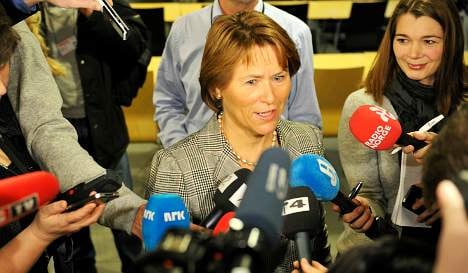The head of Norway's Police Security Service (PST), Janne Kristiansen, widely criticised after the July 22nd attacks last year, informed the justice ministry on Wednesday night of her decision to give up her post.
Amid heightened tensions between Pakistan and the West, her remarks sparked a diplomatic dance in Islamabad and Oslo, with Norwegian and Pakistani ambassadors rushing to meet officials of their host countries and exchange information.
"PST chief Janne Kristiansen has informed me that she is resigning from her post effective immediately," Justice Minister Grete Faremo told reporters.
"The reason is that a possible breach of her duty to maintain confidentiality has been observed through the revelation of classified information," she added, describing the facts of the case as "extremely serious."
The minister was referring to Kristiansen's appearance on Wednesday before a parliamentary committee during which she revealed that Norway's military intelligence, the E Service, had agents in Pakistan.
The E Service "would have to answer themselves (but) they are represented in countries that you have in mind," she said in answer to a question from a parliamentarian on Norway's contacts with Pakistan.
Her comments come as Western powers, led by the United States, expressed suspicions about the Pakistani services clandestinely supporting the Taliban in Afghanistan, where NATO-member Norway has around 400 troops stationed.
Both Norwegian and Pakistani authorities were quick to stress that Kristiansen's gaffe would not harm relations.
The meetings with the ambassadors of both countries "confirmed that the bilateral relations were good, that the remarks yesterday (Wednesday) have not changed that and that there are no unresolved questions," Norwegian foreign ministry spokesman Kjetil Elsebutangen told reporters on Thursday.
Pakistan's ambassador to Norway, Ishtiaq Andrabi, agreed, insisting: "I can't see anything out of the ordinary."
"It will not harm the relationship," he told reporters after his meeting at the foreign ministry, stressing that the two countries cooperate closely in a
number of areas, including on counter-terrorism.
A special unit of the Norwegian police has launched an investigation to determine if Kristiansen's comments breached her duty to maintain confidentiality, unit chief Jan Egil Presthus told AFP.
Kristiansen had been criticised for her comments defending the PST's failure to detect and stop Norwegian right-wing extremist Anders Behring Breivik, who has confessed to the July 22nd twin attacks that killed 77, many of them teens.
"Even (former) East Germany's Stasi (secret service) would not have been able to detect this person," she said of Behring Breivik three days after the attacks.
But it subsequently turned out that the intelligence services had ignored or underestimated information that might have drawn attention to Behring Breivik.
Kristiansen had to apologise for her remarks but resisted calls from the opposition parties at the time to resign.



 Please whitelist us to continue reading.
Please whitelist us to continue reading.
Member comments